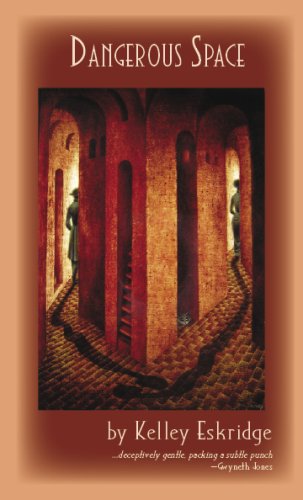This week I’d like to consider (and offer up for discussion) a narrative device that I’ve read in several stories and heard in discussions about writing gender beyond the binary: not using any pronouns for a character. Not revealing their gender.
Usually this is achieved by a story being written in first person, from the character’s perspective. Other characters won’t use pronouns or other gender markers when referring to them. No one in the story will question their gender, but no one will state it.
One of the more interesting examples of this is found in Kelley Eskridge’s Dangerous Space, a collection of stories. “And Salome Danced” is about Mars, auditioning actors for a performance of Salome, faced with an actor who first auditions as a man for the role of John the Baptist, then as a woman for Salome. The actor, Jo, is dangerous and powerful. It’s an unsettling narrative choice for a person who is more than one gender and I can’t say I liked it. But there is Mars. The story never reveals Mars’ gender.
Mars recurs in two more stories in the collection: “Eye of the Storm” (reprinted in Lee Mandelo’s Beyond Binary, where I first encountered Mars) and “Dangerous Space.” In none of them is Mars’ gender revealed.
I like and dislike this.
There are people whose gender is best represented by not being ‘revealed’ by pronouns and other markers. People who don’t find any pronouns applicable to their gender. People who don’t think their gender is anyone’s business. People who aren’t gendered. On the other hand, not revealing a character’s gender leads to assumptions. Those assumptions can certainly be interesting to observe, but not positively: the character will be gendered according to what they do in the story (do they do male things or female things?), or, at times, in line with the author’s (perceived) gender. Almost always male or female. This barely troubles the gender essentialism of how ‘male’ and ‘female’ people are defined, let alone the binary default: the answer to ‘What gender is this character?’ is rarely non-binary or non-gendered. Nor, I sometimes suspect, is it intended to be.
Even if the author intends the reader’s questioning to go beyond the binary, I question the usefulness of this method. How many readers will answer ‘neither’?
I worry that it leaves non-binary gender invisible.
It is easy to write a visible non-binary character without making the story about gender: use non-binary pronouns. Spivak, singular ‘they’, ‘se’ (effectively used in Elizabeth Bear’s Undertow), and so on. Use the pronouns as a fact of life, not questioned.
I dislike my own suggestion: that we write about gender in ways that are determined by the assumptions of people who cannot see non-binary gender unless it’s pointed out for them. Even then, one reviewer read singular ‘they’ in Benjanun Sriduangkaew’s “Annex” and thought a human is an alien, as I mentioned in a recent roundtable at Strange Horizons about reviewing and diversity. (A less frustrating reason to be careful with singular ‘they’ in science fiction is the potential confusion if there are multi-bodied characters.) Some readers don’t want to see non-binary gender.
What do we do?
My preference is probably unsurprising: write stories in which non-binary gender is clear, varied, individual to multiple people. In a story that truly troubles binary gender—or is so far from it that the idea of ‘binary’ is meaningless—a character whose gender is not revealed will not be lost in the binary. Mars in “And Salome Danced” is interesting: a foil to Jo, a steady presence where Jo is dangerously gendered. The academic editing the texts in Siri Hustvedt’s The Blazing World is interesting too: gender un-revealed in a book that crosses the binary so much that it starts to cross it out. But I do wonder what answer the author has in mind. (I’ll be talking about this book in full in my next post.)
I don’t want non-binary gender to be invisible. I don’t want non-binary gender to be primarily written for the people who don’t want to see it. I certainly don’t want to tell writers what they must and mustn’t do (beyond “Non-binary people are real people, try to write accordingly”), but I think there’s a conversation to be had about not revealing gender and how it relates to writing post-binary gender. I’d certainly be interested in discussing it further.
Alex Dally MacFarlane is a writer, editor and historian. Her science fiction has appeared (or is forthcoming) in Clarkesworld, The Other Half of the Sky, Gigantic Worlds, Solaris Rising 3 and The Year’s Best Science Fiction & Fantasy: 2014. She is the editor of Aliens: Recent Encounters (2013) and The Mammoth Book of SF Stories by Women (forthcoming in late 2014).










